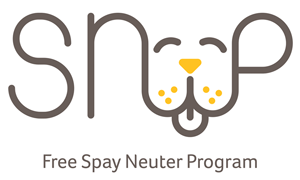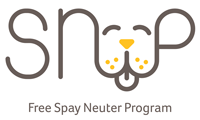NO – We are separate and apart from the other animal welfare organizations on-island – but often times we work closely with them – performing their spay neuter surgeries when required and liaising with them when we encounter animals that are to be surrendered.
SNiP also holds a monthly Spay Day – a full day, every month dedicated solely to FREE spay neuter.
Between the weekly appointments and our monthly Spay Day, most animals have a maximum wait time of 1 to 2 weeks (obviously situations vary based upon animals age & health).
Neutered male dogs tend to stick around and protect their homes better. Intact males are out looking for mates and therefore do not fulfill their role as protectors of their homes.
By sterilizing your animal you are ensuring that your animal does not contribute to our animal overpopulation problem in TCI.
However, volunteers are willing to help do pickups based upon availability – but that likely means that your animal will have to wait longer to get in.
What if its not really my animal – but one that wanders into my yard and has made my yard it’s home?
Contact SNiP to discuss the specific circumstances and we very likely can help you.
You will sign a Surgical Consent form (available in English & Creole) and your animal will be admitted to the clinic. Your animal is given a brief physical evaluation by the Veterinary team to ensure it seems healthy enough for surgery – however NO pre surgical bloodwork is done.
Your animal is sedated and sterilization surgery performed – for females that means that her ovaries & uterus are removed, for males their testicles are removed. All animals are given a green tattoo on their abdomen to indicate that they have been sterilized.
Animals are monitored during recovery and when sufficiently recovered are sent home with Discharge Instructions and pain medicines.
If the animal is an outdoor animal with no safe place to recover, we will keep the animal overnight at the clinic so they can safely recover indoors without being bothered by weather or other animals.
Males can mate and reproduce as early as 6 months of age. To prevent them wandering we recommend neutering your male by 6 months of age.
Animals can be sterilized as young as 8 weeks of age, as long as they weigh 2 lbs or more.
All animals need to be healthy to undergo surgery.
In order to keep our costs as low as possible, SNiP is provided all the medicines at cost.
There are many supplies that go into running the program beyond the medicines required for the actual surgery. Some of these are:
– New collars for animals that require one to help identify them as being ‘owned’ and sterilized
– Tags attached to the collars that indicate the animal has been sterilized
– Flea / tick medicines – all animals not on flea / tick prevention are given either a Nexgard or Bravecto to ensure they come into the clinic flea / tick free
– Take home pain management medicines
– Ancillary medicines used to treat any visible injuries / illness / infection at time of surgery
– Purchase of dog & cat traps & wire cages for transport
– Photocopy costs of the take home paperwork / discharge instructions
– In clinic food for animals staying & recovering overnight at the clinic
– Kitty litter for cats staying & recovering overnight at the clinic
– SNiP telephone costs
SNiP has made the concerted effort to keep costs low – we do not have business cards nor a vehicle for animal pickups – we utilize our volunteers vehicles. Of course, if someone wants to donate a vehicle – we would be very happy to receive one!

